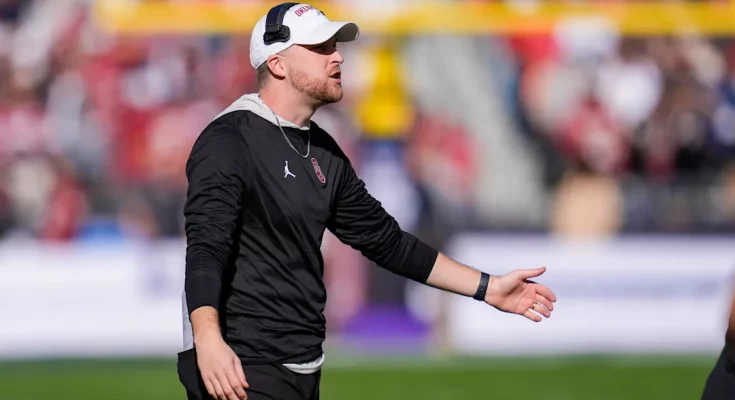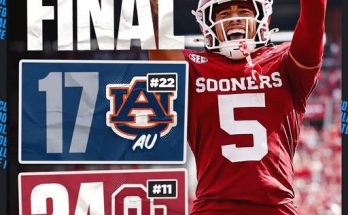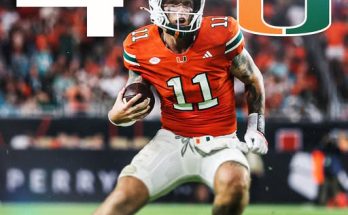Ben Arbuckle’s coaching journey has been anything but ordinary, and as he steps into his first season as Oklahoma’s offensive coordinator, the expectations are both daunting and exhilarating. At just 29 years old, Arbuckle represents the new wave of offensive minds in college football—analytically savvy, aggressive, and determined to push the envelope. Yet, despite his reputation as one of the fastest-rising offensive coaches in the game, Arbuckle remains humble and introspective about his journey and his place within one of the most storied programs in college football history. As the Sooners prepare for a pivotal season, one that marks their entrance into the Southeastern Conference (SEC), all eyes are on Arbuckle and how he will shape the identity of Oklahoma’s offense in this new era.
When Oklahoma head coach Brent Venables tabbed Arbuckle as the new offensive coordinator, eyebrows across the country were raised. It wasn’t because Arbuckle didn’t have the resume—he had just engineered a top-ten offense at Washington State in 2023—but because Oklahoma is a pressure cooker of a job. It is not just about calling plays; it is about maintaining a legacy that includes offensive innovators like Lincoln Riley, Josh Heupel, and Kevin Wilson. Arbuckle knows this. He doesn’t hide from the weight of the job. In fact, he embraces it. But even he admits that he is still learning, still evolving, and still refining the vision of the offense he wants to bring to life in Norman.
What makes Arbuckle’s rise so compelling is how rapid it’s been. Just a few years ago, he was working behind the scenes at Western Kentucky, helping mastermind one of the most explosive offenses in the country under Zach Kittley. When Kittley moved on to Texas Tech, Arbuckle was handed the reins at WKU in 2022, and the results were immediate: the Hilltoppers ranked third in the nation in total offense and second in passing yards. His success earned him the job at Washington State, where he guided quarterback Cam Ward to a breakout season and helped the Cougars become one of the Pac-12’s most dangerous offensive teams. That body of work—combined with his youthful energy and innovative scheme—convinced Venables that Arbuckle was the man to lead the Sooners into the SEC.
But Oklahoma is not Western Kentucky. It’s not Washington State. It is a program with blue-blood expectations and national championship ambitions. Every play call, every red zone trip, every third-and-short will be dissected and analyzed by a rabid fanbase that has grown used to fireworks on the offensive side of the ball. Arbuckle is fully aware of the challenge ahead. He speaks often about how the move to Oklahoma has forced him to reevaluate and recalibrate. It’s not just about scheme anymore—it’s about relationships, leadership, accountability, and managing pressure in a way that allows his players to flourish.
One of the biggest questions facing Arbuckle is how his offensive philosophy will translate to the SEC. The Big 12 was a conference defined by spread offenses and high-scoring affairs, but the SEC is a different beast. Defenses are faster, more physical, and more complex. The margin for error is smaller, and the chess match between coordinators is more intense. Arbuckle acknowledges that the transition will require adaptation. He isn’t married to a system as much as he is to principles: tempo, spacing, and leveraging matchups. He wants to play fast, keep defenses off balance, and create opportunities for his playmakers to win one-on-one battles. But he also knows that SEC defenses won’t be caught off guard by the same tactics that worked in the Group of Five or the Pac-12.
To that end, Arbuckle has spent the offseason studying some of the most successful offenses in the SEC—programs like Alabama, Georgia, and LSU—to understand how they marry explosiveness with physicality. He has also leaned heavily on Oklahoma’s offensive staff, many of whom bring years of experience in the league. Together, they are working to build an offense that can survive and thrive in the gauntlet that is SEC football. That means installing new wrinkles in the run game, adding protection schemes that account for exotic blitz packages, and emphasizing situational football in a way that perhaps wasn’t as critical at his previous stops.
But beyond the Xs and Os, Arbuckle’s greatest challenge might be building trust within the locker room. The Sooners are loaded with talent—returning quarterback Jackson Arnold is a former five-star recruit with immense upside, and the offensive line boasts several NFL-caliber prospects—but talent alone doesn’t guarantee results. Arbuckle must connect with his players on a deeper level, earning their belief in the system and the vision. By all accounts, he’s off to a strong start. Players have praised his communication style, his willingness to listen, and his intensity in practice. He demands excellence but does so in a way that empowers rather than intimidates.
What also sets Arbuckle apart is his willingness to admit what he doesn’t know. He often describes himself as a “constant learner,” someone who is obsessed with film study, open to feedback, and unafraid to tweak his approach. That humility could serve him well at Oklahoma, especially during the inevitable ups and downs of a grueling SEC schedule. Arbuckle is not pretending to have all the answers. He understands that growth comes through failure as much as success, and he’s made it clear that he welcomes the challenge of evolving in real-time, both as a play-caller and as a leader.
There is also the added pressure of timing. Oklahoma’s move to the SEC coincides with a pivotal moment for the program. The Sooners are coming off a stretch of seasons that, while not disastrous, have fallen short of their usual standard. There is a palpable hunger among fans and alumni to reassert Oklahoma as a national powerhouse. That urgency will only heighten the scrutiny on Arbuckle, especially if the offense struggles early. Every slow start, every stalled drive, every turnover will be magnified in the SEC spotlight. Yet, Arbuckle seems unfazed. He talks about pressure as a privilege, a byproduct of coaching at a place where winning isn’t just expected—it’s demanded.
His relationship with Brent Venables will also be a key factor in determining how successful this transition is. Venables is a defensive-minded head coach with a reputation for intensity and detail. Arbuckle’s style is more laid-back, more collaborative, but the two seem to complement each other well. Venables has given Arbuckle the freedom to implement his system, but he also provides structure and accountability. That balance could be crucial as Oklahoma navigates the brutal SEC schedule, where games are often decided by razor-thin margins and adjustments are everything.
There’s also the question of identity. What will an Oklahoma offense under Ben Arbuckle look like when the pressure is on and the stakes are highest? Will it be a spread-heavy attack that relies on tempo and vertical shots, or will it be more balanced, more methodical, and more adaptable? Arbuckle has hinted that the answer might be somewhere in between. He believes in playing to his personnel, in crafting a system that highlights strengths and masks weaknesses. That flexibility is refreshing in a sport where so many coaches cling to dogma. It also suggests that Arbuckle is wise beyond his years—aware that success in the SEC won’t come from trying to outscheme opponents, but from out-executing them in the moments that matter most.
As the season approaches, there is a quiet confidence building within the Oklahoma program. Players talk about the energy Arbuckle has brought to the facility, the clarity with which he communicates, and the excitement surrounding the new offensive system. While there will undoubtedly be growing pains, there is also a sense that something special could be brewing. Arbuckle isn’t trying to replicate the past. He’s not trying to be the next Lincoln Riley or Jeff Lebby. He’s trying to be the first Ben Arbuckle, and that authenticity is resonating.
Still, the margin for error is razor-thin. The SEC doesn’t allow for long learning curves, and Arbuckle knows that he will be judged not just by his ideas, but by the results on Saturdays. It’s a reality that every young coordinator must face, especially at a place like Oklahoma. But Arbuckle isn’t shrinking from that reality. He’s leaning into it, sharpening his approach, and embracing the evolution that comes with leading an elite program through one of the most consequential transitions in its history.
In many ways, Ben Arbuckle’s story is still being written. He is not a finished product, nor does he pretend to be. But that might be his greatest strength. He is evolving—not just as a coach, but as a leader, a strategist, and a steward of a proud football tradition. Whether that evolution results in immediate success remains to be seen. But one thing is clear: Arbuckle is not content with simply arriving at Oklahoma. He wants to grow with it, build with it, and ultimately win with it. And in the crucible of the SEC, that journey—filled with challenges, setbacks, and triumphs—may end up defining not only his career, but the future of Oklahoma football.



